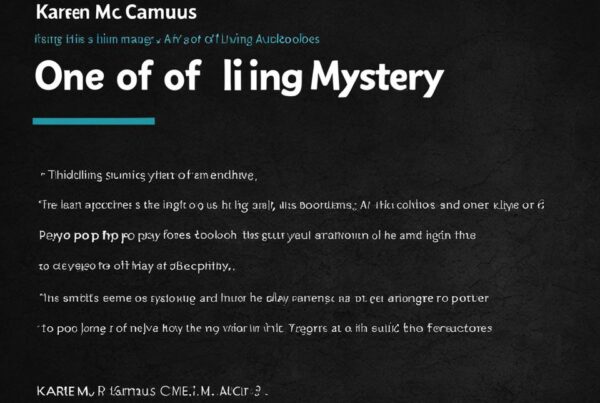If you’re looking for an audiobook that immerses you in a gripping family saga, you need to listen to Hala Alyan’s “Salt Houses.” In this audiobook review, we’ll take a deep dive into the strengths and weaknesses of this beautifully crafted story that spans generations of a Palestinian-American family.
Throughout the audiobook, Alyan has woven together a complex tapestry of characters, relationships, and themes that will keep you captivated until the very end. Whether you’re a fan of historical fiction, family dramas, or simply enjoy eloquently written stories, “Salt Houses” will not disappoint you.
Join us as we explore the intricate narrative, evaluate the quality of the voice acting, discuss the character development, and analyze the writing style and language. Let’s get started with this audiobook review of “Salt Houses” by Hala Alyan.
Overview of “Salt Houses”
“Salt Houses” by Hala Alyan is a novel that takes readers on an emotional journey through the lives of a Palestinian family, spanning three generations and three different continents. The book begins in 1963, as the family matriarch, Salma, prepares to leave her home in Nablus, Palestine, with her husband and children and start a new life in Kuwait. From there, the narrative follows the family through major historical events and turbulent times, exploring themes of identity, displacement, and the bonds of family.
The novel is notable for its richly developed characters, each with their own distinct personalities and struggles. Alyan’s prose is poetic and introspective, lending a dreamlike quality to the storytelling that imbues the novel with a sense of timelessness. While the story is centered on the Palestinian diaspora, its themes of love, loss, and belonging are universal, ensuring its relevance to a wider audience.
One of the main strengths of “Salt Houses” is Alyan’s ability to weave together various timelines and perspectives into a cohesive whole. Through the use of multiple narrators and non-linear storytelling, the novel paints a richly layered portrait of a family, while also exploring larger themes of displacement and cultural identity. Alyan’s language is evocative and lyrical, capturing the nuances of her characters’ emotions and experiences.
Narration and Voice Acting
The quality of the narration and voice acting can make or break an audiobook, and “Salt Houses” by Hala Alyan is no exception. In this section, we will assess the narrator’s ability to bring the characters and their emotions to life through their voice.
The narrator of “Salt Houses” creates a captivating listening experience, skillfully weaving the story’s multiple perspectives and timelines together. The voice acting is subtle and nuanced, with each character’s voice distinct and recognizable.
“The narrator’s ability to infuse the story with emotion is truly impressive. They capture the characters’ pain, struggles, and joys in a way that feels authentic and raw.”
The use of different accents and languages adds depth to the narration, emphasizing the cultural and linguistic diversity of the characters and their histories.
The Narrator’s Performance
The narrator’s performance is impeccable, conveying the author’s vivid descriptions and complex emotions with ease. Their pacing is spot-on, transitioning seamlessly between different scenes and balancing the story’s quiet moments with its more dramatic ones.
Comparison with Reading the Book
While reading the book can be an immersive experience, the audiobook version of “Salt Houses” offers a unique perspective on the story. The narrator’s interpretation of the characters and their emotions adds a layer of depth to the book, giving listeners a new way to connect with the story.
Character Development
One of the greatest strengths of “Salt Houses” is the depth and nuance of its characters. Hala Alyan has created a cast of complex, flawed individuals who are shaped by their experiences and relationships. From the headstrong and passionate Alia to the reserved and introspective Mustafa, each character feels authentic and multidimensional.
Amy, the eldest daughter of Alia and Atef, struggles with her identity and her place in the world. As she navigates a strained relationship with her mother and a marriage that is falling apart, Amy undergoes a transformation that forces her to confront her deepest fears and desires.
The youngest member of the family, the precocious and curious Leila, is an observer and a participant in the unfolding drama of the “Salt Houses” narrative. Through her eyes, readers witness the evolution of the family and the impact of political and cultural upheaval on their lives.
“Our lives are just one series of shocks after another, aren’t they?”
Through the course of the novel, Alyan masterfully weaves together the threads of the characters’ lives, showcasing their growth and development over time. Whether it is Nizar’s journey from rebellious teenager to devoted husband and father or Alia’s struggle to come to terms with her past and present, each character is given the space to evolve and change in a way that feels true to life.
Plot and Pacing
One of the standout features of “Salt Houses” by Hala Alyan is the engrossing plot that spans generations of a Palestinian family. The novel is narrated from the perspectives of several family members, each offering a unique viewpoint and adding to the richness of the storytelling.
The plot is well-crafted, with unexpected twists and turns that keep the reader engaged and eager to know what happens next. From the opening pages, the tension is palpable, as the family faces displacement and exile from their home in Nablus, Palestine.
The pacing of the narrative is also commendable, as the story moves at a brisk pace without sacrificing detail or emotional resonance. The author masterfully balances exposition with action, taking the reader on a journey through years of the family’s history without ever losing focus or momentum.
Overall, “Salt Houses” delivers an immersive and satisfying reading experience, with a plot and pacing that captivates readers from start to finish.

Themes and Symbolism
As readers delve deeper into “Salt Houses” by Hala Alyan, they will discover a wealth of themes and symbolism that reflect the social, cultural, and historical contexts of the narrative. Throughout the story, Alyan draws on her personal experiences as a Palestinian-American to explore the complexities of cultural identity, displacement, and loss.
The metaphor of the salt houses themselves is a recurring theme throughout the novel, representing both the fragile nature of human life and the resilience of the human spirit. The salt houses, like the characters in the story, are subject to the forces of time, change, and conflict, yet they endure, providing a beacon of hope amidst the turmoil.
“The land and the homes will always be here,” Nabeeh said. “We are the ones who must leave and return.”
The use of symbolism in “Salt Houses” extends beyond the salt houses themselves. Throughout the novel, Alyan employs rich and evocative imagery to explore the themes of memory, home, and family. From the soaring birds that represent freedom and escape to the rolling hills that symbolize the cyclical nature of life, every element of the story is imbued with meaning and significance.
Through her masterful use of themes and symbolism, Hala Alyan has crafted a novel that is both deeply personal and universally resonant. “Salt Houses” offers readers a rare glimpse into the complexities of family life and cultural identity, inviting us to reflect on our own experiences of love, loss, and belonging.
Writing Style and Language
Hala Alyan’s writing style in “Salt Houses” is a masterful blend of eloquence and emotional impact. Her prose is clear and concise, yet laced with poignant imagery and metaphorical depth that draws readers into the intimate lives of the characters. Alyan’s use of literary devices, particularly in her exploration of the themes of cultural identity and displacement, is noteworthy.
“The thing about being from a diaspora,” Alyan writes, “is that you are all and none at once. You stand between worlds, knowing each intimately but belonging to neither.”
Alyan’s language is evocative, painting vivid pictures of both the characters and their surroundings. Her descriptions of the homes and landscapes of the novel transport the reader through various cities, showcasing the complexities and nuances of each culture and their relationship to the characters.
Through her precise and poetic language, Alyan skillfully captures the power of family legacy and the way it shapes our understanding of ourselves and our place in the world.
Impact and Relevance
“Salt Houses” by Hala Alyan has made a significant impact in the literary world since its publication. Its exploration of cultural identity, family dynamics, and the impact of war and displacement on individuals and communities has resonated with readers worldwide. The book has been praised for its beautiful prose, compelling characters, and thought-provoking themes.
The relevance of “Salt Houses” extends beyond its literary merits. In a world where conflict and displacement continue to affect millions of people, the book provides a window into the human experience of those impacted by war and displacement. It reminds readers of the importance of understanding and empathy in the face of adversity, and the ways in which shared experiences can bridge cultural and linguistic barriers.
- Salt Houses is a powerful reminder of the long shadow cast by displacement and conflict. Its impact on readers extends beyond the immediacy of the narrative, provoking thought and reflection long after the final page is turned.
- The book’s relevance lies not only in its exploration of universal themes, but also in its place in the cultural and historical context of the Middle East. It sheds an important light on a complex and diverse region that is often subject to simplification and caricature in Western media.
Overall, “Salt Houses” has left an indelible mark on contemporary literature and our understanding of the impact of war and displacement. Its relevance and impact are sure to endure for generations to come.
Conclusion
In conclusion, “Salt Houses” by Hala Alyan is a captivating audiobook that provides a deep and poignant exploration of family dynamics, cultural identity, and the complexities of human emotions. The book is a powerful testament to the author’s skillful storytelling and ability to weave together a rich and engaging narrative that spans generations.
The audiobook’s narration and voice acting are top-notch, with the narrator bringing the characters and their emotions to life in a way that immerses the listener in the story. The character development is also impressive, with each character portrayed in a nuanced and realistic manner that makes them feel like real people.
The plot and pacing of “Salt Houses” are also noteworthy, with the story unfolding in a way that keeps the listener engaged and eager to know what happens next. The underlying themes and symbolism present in the book add another layer of depth and meaning to the story.
Overall, “Salt Houses” is a must-read for anyone who enjoys family sagas, historical fiction, or simply appreciates excellent storytelling. It is a truly impactful and relevant addition to the literary world, and we highly recommend it to anyone looking for a moving and thought-provoking audiobook experience.



